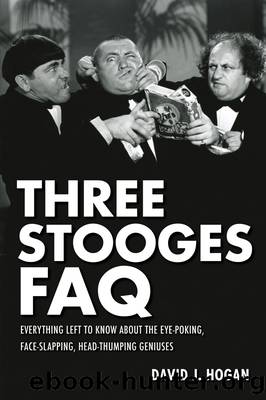Three Stooges FAQ by David J. Hogan

Author:David J. Hogan [Hogan, David J.]
Language: eng
Format: epub
Tags: PER004030 PERFORMING ARTS / Film & Video / History & Criticism; PER004040 PERFORMING ARTS / Film & Video / Reference
ISBN: 9781557839329
Publisher: Applause Theatre & Cinema Books
Published: 2012-03-20T00:00:00+00:00
Recipe for disaster in A Pain in the Pullman (1936): the Stooges, a train, a monkey in a sailor suit, a big-headed actor (James C. Morton, in dark suit), and a short-fused chaperone (Bud Jamison).
Photo courtesy of Ted Okuda
A Pain in the Pullman played so well that Columbia remade it as Training for Trouble, a 1947 vehicle for contract comics Gus Schilling and Richard Lane.
Actors laugh very hard in Loco Boy Makes Good (1942). Throughout much of this rather desperate short, supporting players and extras laugh and laugh. Picture the laughter as a wave, enormous and roaring toward the beachâand when it gets there, the wave is just a dribble, a sad thing, because it was laughter created from very little worth laughing about.
Loco Boy Makes Good doesnât fall apart, but thatâs only because it never properly comes together in the first place. Some fundamental mistakes account for its undoing. Chief among those is that the film flirts with sentimentality, utilizing the dire situation of an old woman as its pivot point. Mrs. Brown (the name of the kindly-seeming actress has been lost) is months behind on the note the bank holds on her run-down hotel. The Stooges are touched by the ladyâs plight, and contribute an apparent fortune, and a lot of sweat equity, to transform her placeâs ground floor into a très élégante supper club. Mrs. Brown is so pitifully grateful she nearly blubbers.
Illogic is another problem. Felix Adler and Clyde Bruckmanâs script establishes that the hotel has had no business because itâs become run-down and shabby. The transformation wrought by the Stooges is impressive (and considerably more protracted in the original script), but the hotelâs past would seem to militate against the likelihood of an opening-night parade of well-dressed swells led by influential gossip columnist Waldo Twitchell (John Tyrrell).
A sign on the sidewalk ballyhoos the featured act, Nill, Null & Void, â3 Hams Who Lay Their Own Eggs.â It all happens inside, at the Kokonuts Grove (a weak play on Bostonâs famed Cocoanut Grove club, where 492 people were killed in a fire that occurred on November 28, 1942, about eleven months after the January 8 release of Loco Boy Makes Good.
Twitchell (who is modeled, of course, on famed columnist and broadcaster Walter Winchell) watches with great, and unjustifiable, glee as the boys play piano, attempt some (intentionally) weak jokes, and threaten to sing âShe Was Bred in Old Kentucky But Sheâs Just a Crumb Up Here.â
Backstage, Curly carelessly puts on a coat belonging to Balbo the Magician (Vernon Dent, whoâs wasted in a single, brief scene). As Curly dances with Twitchellâs attractive friend, Miss Stompandale (Dorothy Appleby), the coat regurgitates a parrot and then a rabbit. The parrot lands on a society matron (Ellinor Vanderveer) and terrifies her, which sends the crowd into amused hysterics. The rabbit is deposited beneath a serving tray as waiter Larry strides by, and when the drunken diner (Eddie Laughton) lifts the lid, heâs so horrified he falls off his chair.
By now, the place is a shrieking bedlam of laughter.
Download
This site does not store any files on its server. We only index and link to content provided by other sites. Please contact the content providers to delete copyright contents if any and email us, we'll remove relevant links or contents immediately.
Spell It Out by David Crystal(36105)
Professional Troublemaker by Luvvie Ajayi Jones(29644)
We're Going to Need More Wine by Gabrielle Union(19027)
The Secret History by Donna Tartt(19010)
Cat's cradle by Kurt Vonnegut(15315)
The Goal (Off-Campus #4) by Elle Kennedy(13644)
The Social Justice Warrior Handbook by Lisa De Pasquale(12179)
The Break by Marian Keyes(9356)
Crazy Rich Asians by Kevin Kwan(9266)
The remains of the day by Kazuo Ishiguro(8956)
Thirteen Reasons Why by Jay Asher(8878)
Educated by Tara Westover(8040)
The handmaid's tale by Margaret Atwood(7736)
Giovanni's Room by James Baldwin(7308)
Win Bigly by Scott Adams(7178)
This Is How You Lose Her by Junot Diaz(6864)
The Rosie Project by Graeme Simsion(6359)
Six Wakes by Mur Lafferty(6226)
The Power of Now: A Guide to Spiritual Enlightenment by Eckhart Tolle(5736)
